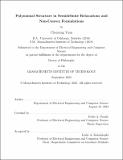Polynomial Structure in Semidefinite Relaxations and Non-Convex Formulations
Author(s)
Yuan, Chenyang
DownloadThesis PDF (2.038Mb)
Advisor
Parrilo, Pablo A.
Terms of use
Metadata
Show full item recordAbstract
Semidefinite relaxation is a powerful tool used to approximate otherwise intractable non-convex problems, but tend to run into scalability issues in large-scale instances. The goal of this thesis is to explore the power of semidefinite relaxations and address the scalability issues, for special classes of problems with polynomial structure.
In the first part of this thesis, we consider semidefinite relaxations of functions on quadratic maps, with applications to approximating permanents of positive semidefinite (PSD) matrices, product of quadratic forms, and can be interpreted as a generalization of MaxCut. The optimization problems and their convex relaxations have a product structure which is crucial in the analysis of approximation quality. We show that these problems are all connected with a unified analysis which recovers tight approximation factors. This leads to better approximation bounds on the permanent of PSD matrices, intermediate relaxations trading off accuracy with computational power, and constant factor approximation bounds for maximizing concave objectives on the image of quadratic maps.
In the second part, we study the global landscape of low-rank sum of squares problems, using a non-convex Burer-Monteiro formulation to decrease the computational cost but with the risk of getting stuck in local minima. We show that in the univariate case where the SDP solution is guaranteed to be rank-2, this formulation does not have spurious local minima. This is in contrast to previous work showing that for general SDPs, in addition to genericity conditions, the rank has to be roughly the square root of the degree of the polynomial for there to be no spurious local minima. We also show that with a particular choice of basis, the gradient can be computed in near-linear time using Fast Fourier Transforms (FFTs). This enables very fast first-order methods, scaling to polynomials with millions of variables.
Date issued
2022-09Department
Massachusetts Institute of Technology. Department of Electrical Engineering and Computer SciencePublisher
Massachusetts Institute of Technology